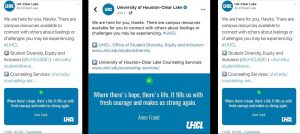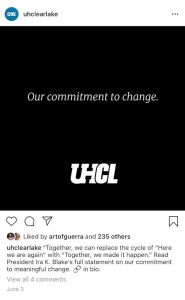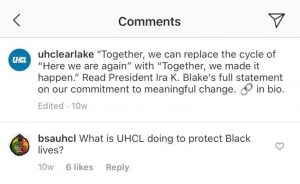EDITORIAL: UHCL’s social responsibility is in fighting against racial injustice
The May 25 homicide of George Floyd by Derek Chauvin, formerly a Minneapolis police officer, sparked worldwide protests against police brutality and racial injustices endured by Black people in the United States.
Floyd’s death provided yet another tragic reminder to the world racism still pervades American society. It was a catalyst for a change that should be inherent and called upon by all — that Black Lives Matter.
Part of the ongoing discussion centers on how individuals and institutions, including higher education institutions like UHCL, are complicit in systemic racism. UHCL is not exempt from this. However, if university leadership is willing to bring lasting, meaningful change to the institution, UHCL can be a part of the solution instead of continuing to be part of the problem.
Thus far, UHCL leadership has failed its students in response to the continued unrest and calls for change.
UHCL’s initial communication regarding Floyd’s death
In the wake of nationwide protests, academic institutions including UHCL and the University of Houston System reached out to their students, faculty and staff.

The first message of any kind from UHCL came June 1 – six days after Floyd’s death – via UHCL’s official Facebook, Instagram and Twitter accounts.
The problem with this response is that it does not actually address Floyd’s death, Black Lives Matter (BLM) or any instances of challenges students might face. It is an impersonal message, made up of platitudes so vague that they may as well be about upcoming finals.
The following day, June 2, Vice President for Student Affairs Aaron Hart sent an email addressing the recent racial injustice. In his email, Hart acknowledged the “long history of racial injustice against Black people in the United States” and shared his personal experience of racial injustice.
Hart’s message aligns more with how the university should have responded. It was kind, fair and it took a stance. He wrote that “we are a community that cares. We speak against these injustices and stand in solidarity against racism with people across the globe.” Additionally, Hart acknowledged that as Hawks, “it is imperative that we understand the impact of societal inequities and explore ways to approach uncomfortable conversations that extend our learning beyond the classroom.”
Hart also provided the same information about resources available for students – Counseling Services and OSDEI – ending the email with an invitation to participate in the June 4 Community Dialogue co-hosted by OSDEI and the Office of Student Involvement and Leadership (OSIL) for students “to discuss recent national events, provide a space to process, and to receive resources.”
The same day, many UHCL offices and departments participated in the Blackout Tuesday campaign on social media, including the university’s official social media channels. These posts were meant to show support, but without any meaningful messaging from the university about how they will address racism on campus, their participation came across as performative at best.

On the June 3 Blackout Tuesday post from UHCL on Instagram, there is a comment from the Black Student Association asking the university what they are doing to protect Black lives. As of Aug. 9, the comment has not been answered.
UHCL President Ira K. Blake sent a June 3 email to the UHCL community titled “Our commitment to change,” explaining the first steps offices at UHCL will take to answer the question “What are we at UH-Clear Lake committed to doing to affect meaningful change?”
Blake’s message opens with “Dear America,” which makes racial injustice seem like an exclusively American problem. The tone of her email was completely inappropriate. By choosing to address all Americans instead of the UHCL community, she has removed UHCL from blame for conforming to racist industry standards. It is inappropriate. Yes, racism is an American problem, but it is also a problem within UHCL.
Blake then outlines the first steps university leadership is committed to taking to affect change:
- Workshops to train faculty from the Center for Faculty Development,
- Establishment of new Center for Engagement, Teaching and Learning,
- Student Affairs’ focus on programming for voting and servant leadership,
- The financial literacy course & one-time scholarship,
- Connecting with BIPOC (Black, Indigenous, people of color) alumni and
- Finding resources to make UHCL more affordable for underrepresented students.
Although the president’s response addresses racism as an issue and details efforts to combat it, there are still many unaddressed issues.

A financial literacy course has no relationship to racism and injustices faced by Black people and implies racism can be weakened by financial literacy.
There is no mention of how the university will uphold the changes if any of the staff, faculty or administrators are not willing to actively support these new commitments.
The information offered is vague and offers the university no immediate, measurable actions for them to uphold.
The Community Dialogue and Town Hall allowed for communication from students
The June 4 Community Dialogue allowed students to raise concerns as well as provide feedback on how UHCL can make sure all students feel safe. This dialogue served as an opportunity for UHCL leadership to view the university from concerned students’ perspectives.
Blake was not in attendance. Hart and Russel Miller, chief of police, although late, did attend the meeting. David Rachita, dean of students, and Iliana Melendez, associate dean of students, were the only deans who stayed for the entire event.
SGA sent a June 25 email inviting students to a Town Hall that took place June 30. This Town Hall acted as a follow up to the Community Dialogue. Those in attendance included administrators like Blake, Hart, Miller, Mark Denney, vice president for administration and finance, and Steven Berberich, senior vice president for academic affairs and provost. Blake apologized for not seeing her email sooner and missing the Community Dialogue.
In the Town Hall students got more information as to why the programs in Blake’s email address were proposed and how administrators will continue to get students’ feedback on them. Hart announced a campus-wide workgroup on race and inclusion where partners from across divisions will help in creating plans that apply to the entire campus.
The promised changes from the UHCL administrators, faculty and staff during the Community Dialogue and Town Hall are a good start because they set a standard as to how the university will move forward in supporting students at UHCL. It also allows students to hold the university accountable for its action – or lack thereof – in the future.
The Community Dialogue allowed university leadership to hear students’ opinions, but only a handful of administrators were part of the event. No executive summary can replace connections made in real-time by attending events, especially if there is a chance Blake and other leaders might miss their email invitation.
Community dialogues and town halls are a great way to start conversations about the needs of students. However, if the people in charge of facilitating change at UHCL are not there to hear students, then what is the point of having these conversations? If the university’s goal is to create lasting change then it must begin with senior leadership for it to reach all levels of the university.
The Town Hall had more administrators present to listen to students’ concerns, however throughout the meeting administrators asked students for help taking action, putting the work on the students.
Students are not the guide book and should not be expected to be. Administrators should do the work and educate themselves on these issues and implement the programs needed.
Additionally, UHCL should not only rely on forums for what to do. Having discussions does not constitute action. A conversation can not and will not replace actual change.
It is not enough to say things will change. Real change does not happen without people who work to make it happen. Those with the authority to combat systemic racism need to take action. By not doing so, the problem will remain and the university continues its complicity in perpetuating systemic racism.
Diversity at UHCL
Diversity is a core aspect of UHCL’s identity. The campus serves a majority non-white population.
UHCL administrators have a responsibility to speak up and take action against anti-Blackness and racial injustice. Students trust UHCL to educate and protect them as they prepare for their careers. UHCL administrators harm Black members of the community when they choose to stay silent or when they place the burden of anti-racism work on BIPOC UHCL students.
The university’s mission statement, core values and strategic plan themes all assert UHCL bears a responsibility to combat racial injustice. These maintain a unified focus on principles of diversity and inclusion, education and understanding of intersectionality.
Actively fighting racism and prejudice at all levels of the university needs to be a priority because students will take what they learn at UHCL and apply it to the rest of their lives. It is vital for UHCL administrators, faculty and staff to care and take an interest in issues faced by Black students and other marginalized students. If they do not, they encourage racism through ignorance and inaction.
The first sentence of the UHCL mission statement states, “The University of Houston-Clear Lake places its highest priority on serving a diverse body of students in every aspect of their university experience.” However, work still needs to happen at all levels of the university to ensure UHCL is living up to its mission, vision and values.
This needs to be felt by students in every aspect of UHCL, not just from OSDEI and other offices in the Division of Student Affairs.
Steps to better serve the Black population at UHCL
It is better late than never for UHCL to start changing and there are things the university could implement – both long-term and short-term – that would have a large impact.
First, there should be a detailed list of measurable actions with an implementation timeline. The timeline should not be vague, it should have specific deadlines. Metrics for the university to assess its success in implementing these changes should also be detailed for transparency and accountability. They should be easily identifiable on the website and accessible to all students. The university needs to send out consistent and constant communication to its students, even a brief statement that ends with “more information coming soon” would go a long way.
UHCL should require employees – not just faculty – to attend training every year to understand systemic racism and learn anti-racist behavior and actions. Additionally, faculty should learn how to advocate for students experiencing racist, sexist, homophobic or otherwise offensive remarks. While opportunities for faculty and staff to educate and train themselves on these issues is important, they should be mandatory for all employees, not opt-in events.
Instead of UHCL offering students an irrelevant financial literacy course, the university should offer a race relations course to inform students of the history of race in academia. While financial literacy is valuable, it has nothing to do with police brutality or racial injustice.
UHCL offers the Common Reader Program as a supplement to the First-Year Seminar, a required course for first-year students. The problem here is that in the spring semester of 2020, UHCL had 825 transfer students enrolled and since the course is not required for them, they are not incentivized to take part in these discussions.
Discrimination and biases should be discussed in every class and should not only be reserved for The Common Reader program. There should be more emphasis on how race has impacted society and translated across different aspects of academia like math, science and history.
It is imperative to educate people about questioning their own biases and progressing society forward within their lives and careers.
Administrators must be present in any forum relating to student concerns. Administrators should treat these discussions as a high priority and attend so they can hear the students and listen to what they feel the university can do to support them best.
UHCL should require all offices to celebrate and educate about diversity on campus. UHCL is a diverse campus; it should not fall on one office and a handful of student organizations to be the voice of inclusion for the entire campus. The strategic plan prominently mentions diversity and inclusion, so every department on campus should exemplify it. There should not be any question as to where UHCL stands as an institution when it comes to racism and discrimination in any form.
Since the university exists to educate students and prepare them for their careers, administrators must take a stance and proactively fight against racism. By not doing so as an institution, they indirectly encourage racism through ignorance and inaction.
CORRECTION: The date of President Blake’s email was June 3, not June 30.


This article is poorly written. You go on about how UHCL is part of the systemic racist problem but then later state that it serves a majority of non-white students. You then go on to what seems like pages long of complaints without feasible solutions. Being a minority myself, what good does it do me to sit through an hours long training session to have someone talk at me about these issues? That’s the best you could come up with? I attended this school for both undergrad and grad and never once experienced any sort of systemic racism you have described. It’s a tragedy that people use BLM to somehow get their spot in the light or in some cases rush to complete an assignment. And then you want the administration to make decisions for you! This university has traditionally taught people how to be a leader. Quit crying and asking for your hand to be held and lead.
You want change? Get out there and vote. Quit complaining about things on the internet. Take peaceful action and LEAD! Vote in ALL the elections all the way from Federal to your local level. That’s the problem with people like you who just sit here and complain. All talk and no action. If I upset you, good! Now go vote. If I have offended you too bad! Everyone’s got an opinion, you don’t have to agree with it.